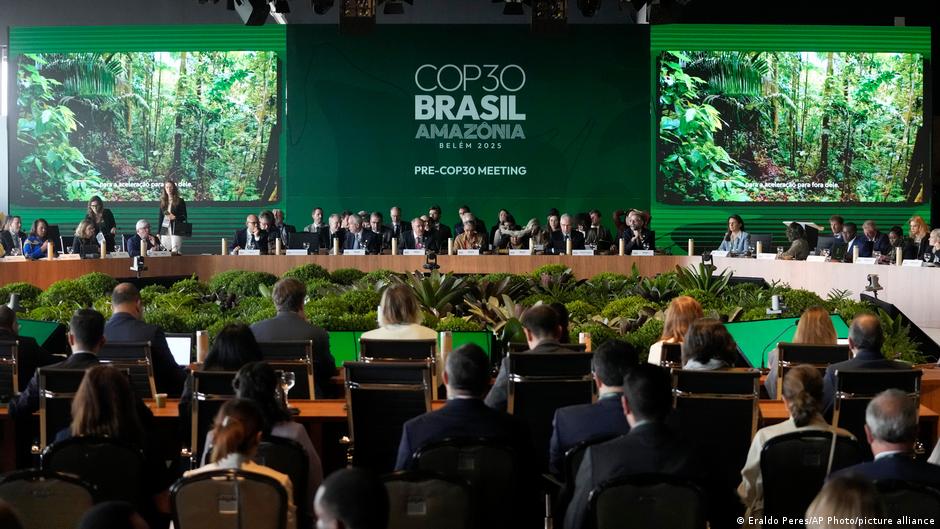Two cruise ships are quietly bobbing in a specially expanded port near the city of Belém in northern Brazil on the banks of the Amazon. They will serve as alternative accommodation for more than 10,000 participants at this year’s climate conference.
40,000 to 50,000 people, including heads of state and government from nearly 200 countries, are expected to attend the 30th United Nations Climate Change Conference, COP30, to discuss greater climate protection measures.
From converted strip clubs to multi-story steamboats, Belém had to get creative with accommodations due to the lack of available rooms and high prices.
Belém is an symbolic choice of location for the summit due to its proximity to the Amazon, a region that is critical to both regional and global climate – even as wildfires, droughts and changing rainy seasons take their toll – and where local communities are on the front lines of the deforestation crisis.
The region is one of the poorest in Brazil. Extreme weather events, which are becoming more frequent and severe due to rising temperatures associated with the burning of oil, gas and coal, have a major impact on low-income communities not only in the country but around the world.
Implementing climate mitigation and emissions reductions
Speaking ahead of the talks, Brazilian President Lula dubbed the event a “conference of truth”, referring to the need to face the reality of climate change and take action. Similarly, the host country calls it an “implementation conference”.
This has certainly been lacking in recent years, with no country currently doing enough to limit global warming to 1.5 °C (2.7 °F) – the limit for which the world agreed to strive for under the 2015 Paris Agreement.
Climate change adaptation is going to be a major issue in Belém. As economies, ecosystems and communities begin to endure more frequent and severe climate impacts, there is an urgent need to mitigate these consequences.
Poor and developing countries, many of which are very vulnerable to the consequences of rising temperatures, are demanding significantly more financial assistance from richer countries that have contributed more to warming the planet.
The 1.5°C target for climate protection does not yet extend to adaptation, and vulnerable countries want to agree on indicators that will evaluate the success of adaptation measures.
There is also the key question of the country’s commitments to reduce planet-heating emissions. All parties to the Paris Agreement were supposed to submit new climate targets in September. But by November, according to COP President Andrés Correa do Lago, fewer than 70 countries had submitted new targets.
“We are disappointed,” Do Lago said. “Two deadlines have already passed without countries meeting their commitments. This is distressing.”
Brazil has a chance to lead amid uncertainty
For Brazil, under the leadership of President Lula, this conference is a top priority as it demonstrates the country’s ability to link sustainable development with economic progress and play a leading role on the world stage.
Global uncertainty related to escalating trade conflicts, the war in Ukraine, and the situation in Gaza has disproportionately influenced multilateral climate policy. Meanwhile, the US, the world’s second-largest greenhouse gas emitter, withdrew from the Paris climate accord after Donald Trump took office and has since withdrawn climate protections.
Observers view upcoming talks with concern
“It is important to have a host for the dialogue that builds trust across all countries,” says Niklas Hohne of Climate Action Tracker, a consortium of German and international think tanks that examine how national climate targets are being implemented.
At the start of the conference, Brazil will present an initiative to protect tropical forests, which are particularly important for climate regulation and biodiversity: the Tropical Forests Forever Facility.
This includes a new fund that will be set up with government money and invested in by private investors. Countries that take special measures to protect their forests will be rewarded with profits from the fund. At least 20% of the payments are earmarked for indigenous communities. The target is to raise a total of US$125 billion (€108 billion) for this fund.
The initiative is a prestigious project for host Brazil, although it remains to be seen how much of this total can be raised during the talks in Belém.
Why is Germany slowing down its ambitions?
Based on current projections, Germany will miss its goal of becoming climate neutral by 2045. The government wants to further expand fossil gas infrastructure and weaken its commitment to renewable energy.
Niklas Hohne said that this is worrying not only for Germany, but also for the European Union. “Germany is an extremely important player in the EU and is also working to relax climate protection measures in the EU,” he said. “This in turn has implications globally. If the EU won’t lead, who will?”
As major economies like Germany lose climate ambition, China is increasingly taking the lead, according to Jan Kowalzig, a climate expert at global NGO Oxfam. However, he is skeptical that China will try to encourage others to be more ambitious.
“In the past, China has been more concerned about protecting its national interests than pursuing collective progress on climate protection,” Kowalzig said.
Mohammed Addo of the non-governmental organization Power Shift Africa says what Belem needs most is “concrete ambitions, concrete technology transfer, not platitudes.”
This article was originally written in German.






Leave a Reply